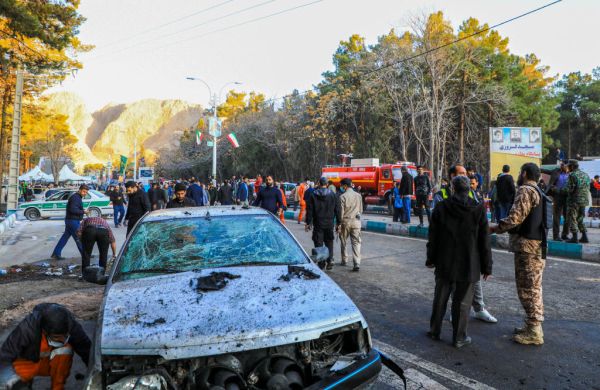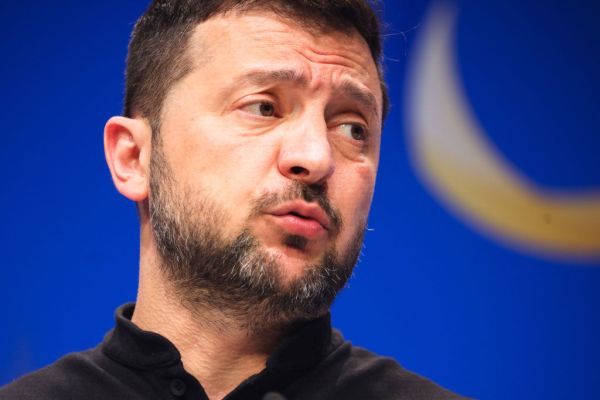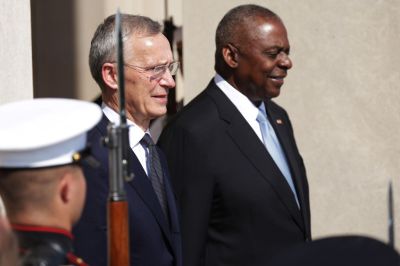This week, NATO leaders will gather in Washington, D.C., for the defensive alliance’s 75th annual summit. The high-profile gathering comes at a moment of political turmoil in the United States, as President Joe Biden struggles to demonstrate his fitness to lead following a poor debate performance late last month.
The 81-year-old Biden, by his own admission, had a very “bad night” as he faced off against former President Donald Trump on the debate stage. But the perception of an enfeebled U.S. president could have consequences that go beyond the ballot box. Amid a period of global unrest, American allies fear bad actors may view the weakened Biden on display at the debate as an opening to push their own agendas.
“America was the real loser in the presidential debate,” a headline for the Iranian state-controlled Tehran Times declared following the June 27 faceoff. The Russian-run news site RT, which covers the president’s public stumbles with a laser-sharp focus, mocked Biden’s “debate disaster.” The Chinese state news agency Xinhua, meanwhile, described the debate as an “American-style reality show” indicative of the broader failure of U.S. democracy.
Yet Biden has struck a defiant tone despite the jeers, insisting he’s up for a taxing presidential campaign and, more importantly, another four years in the world’s most powerful office. In a prime-time interview with ABC News on Friday, the president said that only the “Lord Almighty” could get him to bow out of the race. Biden also used the opportunity to tout his foreign policy record: a brewing peace plan in the Middle East, alliance-building in the Indo-Pacific, and a strengthened NATO. But going into this week’s summit, which will span from Tuesday to Thursday, it’s unclear if U.S. allies remain confident in the leadership on display in Washington.
Several European diplomats privately voiced concerns about Biden’s debate performance, and one senior European official told the New York Times they were “shocked” by Biden’s seeming physical decline at the June G7 summit. Others are worried about the potential ramifications for European security should voters’ concerns about Biden’s age ease Trump’s path to another term. “If they can change the horse, they should,” a European diplomat told CNN, referring to the possibility of Democrats replacing Biden on the November ballot.
Many U.S. allies, particularly in Western Europe, have viewed Biden’s reelection as vastly preferable to the prospect of Trump’s return to the Oval Office. The former president spent much of his first term lambasting NATO for several of its member states’ failure to commit the required 2 percent of their GDP on defense.
European military spending rose expeditiously following Russia’s full-scale invasion of Ukraine in February 2022, but Trump’s criticisms of the defensive alliance have persisted. At the debate last month, the former president once again accused Washington’s European partners of not paying their fair share on national defense. Asked by the moderators if he would pull the U.S. from NATO if elected, Trump simply shrugged.
The former president also has generated anxiety among European leaders about the future of U.S. support for Ukraine should he win in November. Some European officials fear Trump, a self-proclaimed “dealmaker,” is likely to push Ukraine toward accepting a truce with Russia that doesn’t uphold its territorial integrity. Reuters reported last month that two of Trump’s advisers had recently presented him with a plan to condition U.S. military aid to Ukraine on its willingness to engage in peace talks with Russia, raising the possibility of American support for a deal that would result in lost territory for Ukraine.
Amid this uncertainty, Biden needs to be up to the task of reassuring the alliance and its enemies of America’s continued commitment to European security.
“Biden needs to send signals to the Europeans that ‘We’re not leaving NATO, we are here, we are engaged, and we’re going to stay engaged notwithstanding the election in November.’ He’s got to get that message to the Europeans, and he’s got to get the message to the Russians as well,” Jim Townsend, former U.S. deputy assistant secretary of defense for Europe and NATO, told The Dispatch. “This kind of thing is a playground for Putin. He likes the turmoil—he will point to that and say, ‘See, this is how democracies work.’”
In the Middle East, too, U.S. partners are bracing for the fallout of a messy presidential race and possible Trump victory. During his Friday interview with ABC, Biden touted “a peace plan for the Middle East that may be coming to fruition” in apparent reference to behind-the-scenes U.S. efforts to broker normalized diplomatic ties between Saudi Arabia and Israel. With the longevity of the Biden administration in doubt, however, the political will in Riyadh and Jerusalem to deliver an outgoing president his crowning foreign policy achievement could wither.
“How countries—including friendly ones like Israel and Saudi Arabia—respond to politically difficult or risky requests made by a president who is widely viewed as weak, embattled, and headed toward near-certain electoral defeat could be quite different from how they respond to a president fully in command and on track to winning a second term,” John Hannah, a senior fellow at the Jewish Institute for National Security of America, told The Dispatch.
America’s adversaries in the region, Iran foremost among them, might likewise behave differently with the U.S. president’s political future hanging by a thread. Biden’s willingness to take a hard line on Iranian aggression, tenuous even at the beginning of his term, is now more in doubt than ever as Israel fights Tehran’s proxies on two fronts: Hamas in Gaza, and Lebanese Hezbollah on its northern border. And looming over the dual crises is Iran’s development of its nuclear program, which continues largely unchecked.
“As Iran contemplates how much further Hezbollah should escalate against Israel on the northern front, or at what point it should make its dash to develop a nuclear arsenal, one key question it’s always asking is ‘How is Washington likely to respond?’” said Hannah, who previously worked in senior foreign policy positions in both Republican and Democratic administrations, including as national security adviser to former Vice President Dick Cheney.
“It’s not hard to imagine how a belief in the diminished capacities of an American president that reduces the chances of a timely, coherent, and forceful U.S. response could lead to a dangerous series of decisions or miscalculations,” he added. An outwardly weak president is a “recipe for overreach, escalation, and a wider war” in the Middle East.







Please note that we at The Dispatch hold ourselves, our work, and our commenters to a higher standard than other places on the internet. We welcome comments that foster genuine debate or discussion—including comments critical of us or our work—but responses that include ad hominem attacks on fellow Dispatch members or are intended to stoke fear and anger may be moderated.
With your membership, you only have the ability to comment on The Morning Dispatch articles. Consider upgrading to join the conversation everywhere.